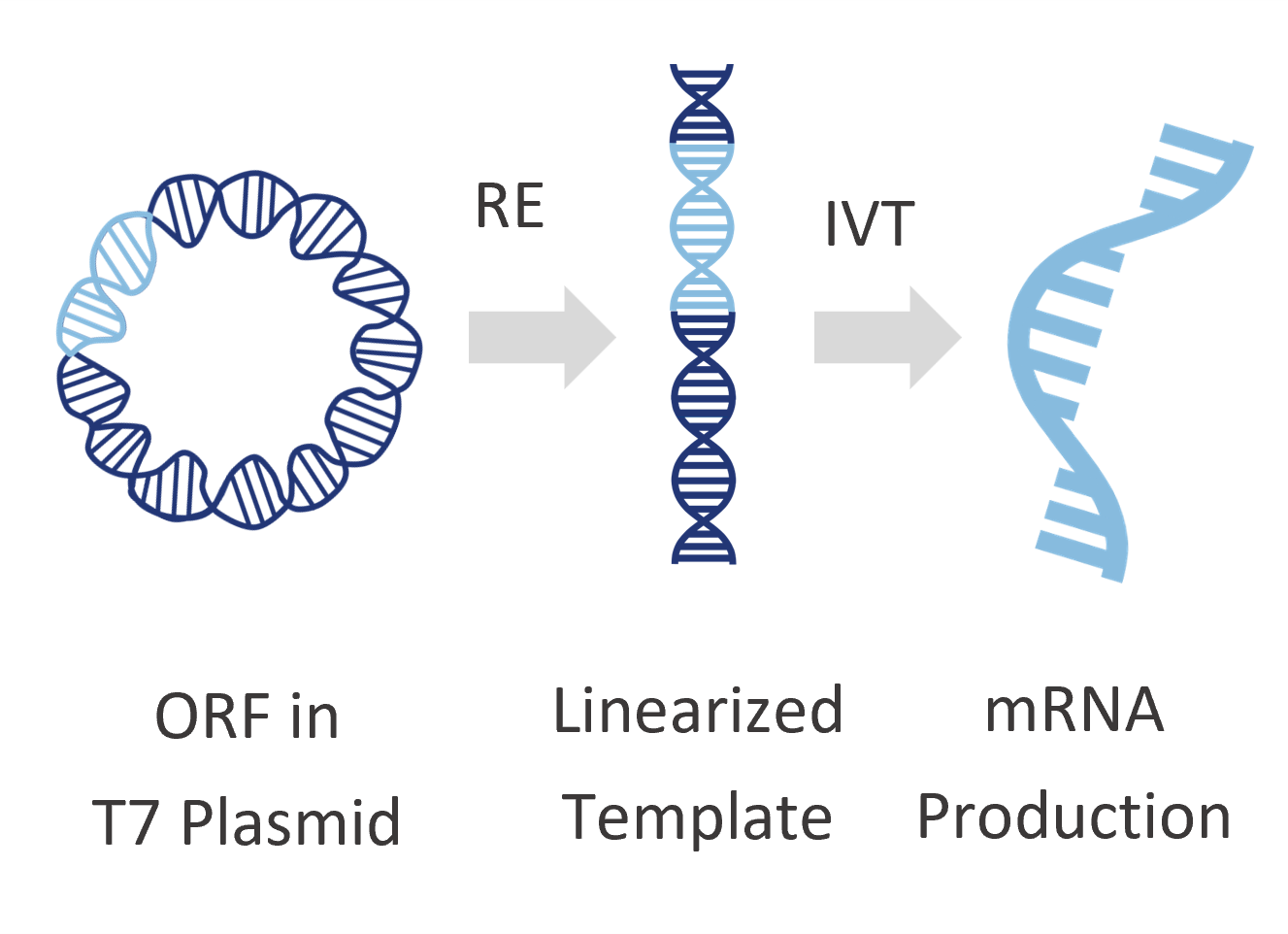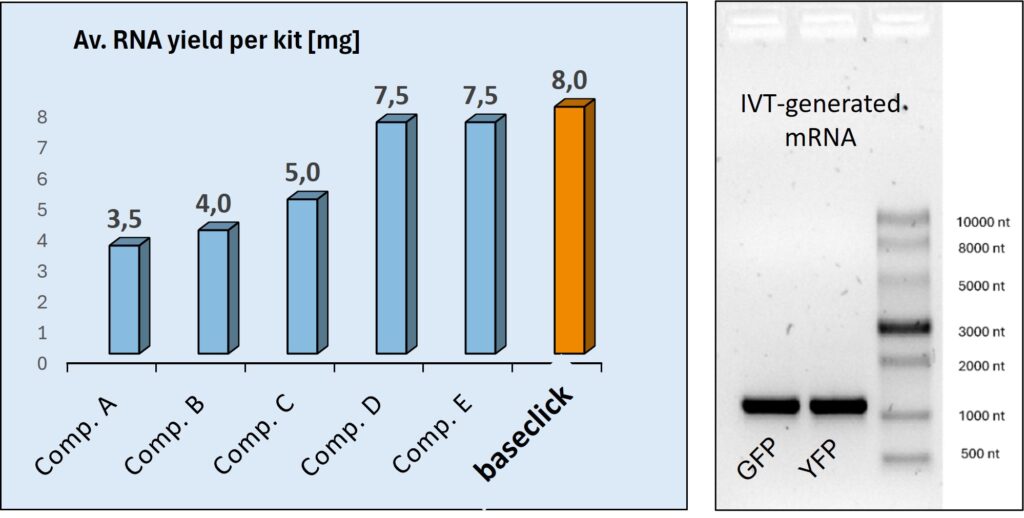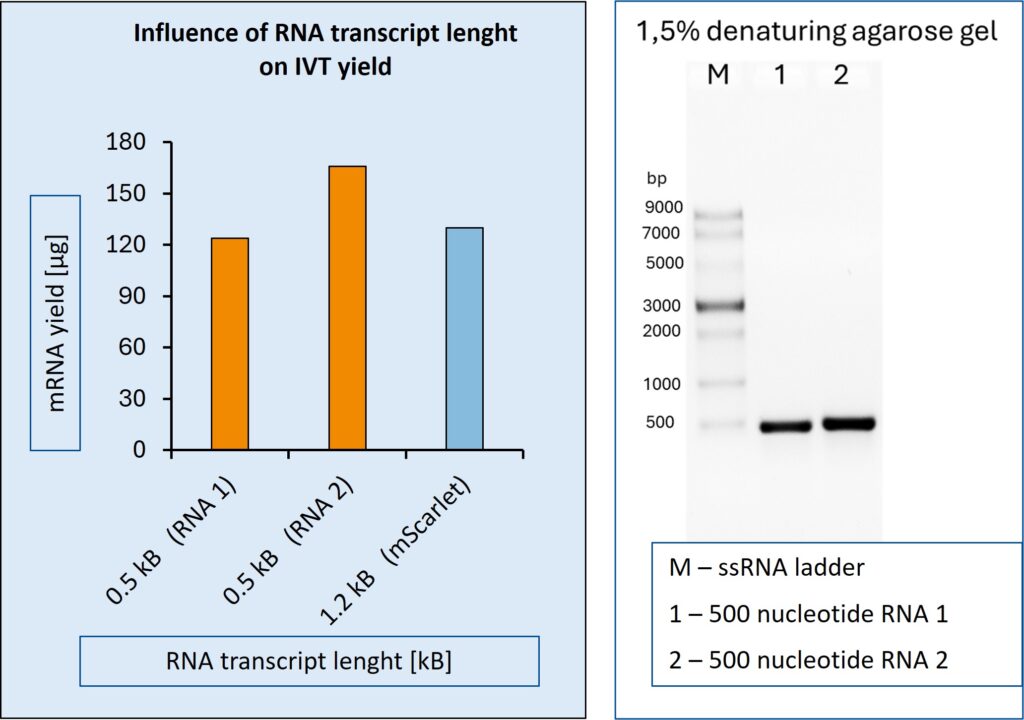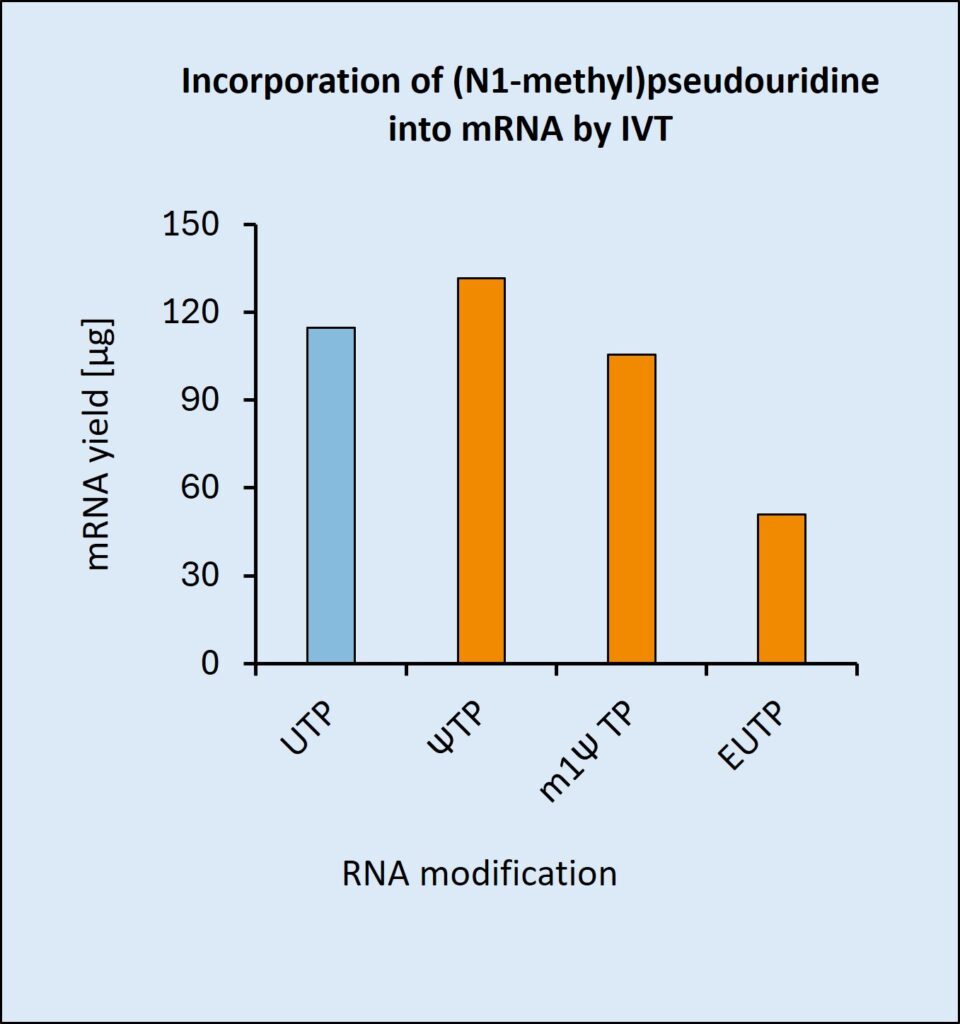IVT High Performance T7 RNA Synthesis Kit
High yield, high purity of full-length mRNA, fully click-chemistry compatible in vitro transcription

| Size | Catalog No. | Price |
|---|---|---|
| 1 Kit / 50 Assays | BCK-RNA-IVT50 | € 230,00 |
| 1 Kit Plus / 50 Assays | BCK-RNA-IVT50+ | € 290,00 |
-
Optimized RNA synthesis with the IVT high performance T7 RNA synthesis kit
The IVT High Performance T7 RNA Synthesis Kit by baseclick is a complete, ready-to-use system for synthesizing RNA from linear DNA templates using T7 RNA polymerase. Optimized for both standard and chemically modified nucleotides, this kit delivers high yields of full-length mRNA in high purity and reliable performance across a wide range of research and biotechnology applications.
The included GMP-grade T7 RNA polymerase ensures exceptional purity and consistency, even for sensitive downstream uses such as mRNA therapeutic and vaccine development, RNA labeling, and translation studies. The kit is fully compatible with click-modified nucleotides and supports synthesis of functionalized RNAs without the need for protocol modifications.
Challenges faced by commercial IVT Kits
Many commercial IVT kits suffer from:
- Low enzyme stability
- Poor compatibility with modified nucleotides
- Inconsistent or suboptimal RNA yields, particularly in demanding workflows such as chemical biology, RNA imaging, or mRNA therapeutic development.
These limitations often result in degraded RNA transcripts, batch variability, and inefficient incorporation of specialized nucleotides, especially when functional modifications are required.
Consistent high-yield RNA synthesis with baseclick’s IVT kit
With baseclick’s IVT High Performance T7 RNA Synthesis Kit, you can expect:
- Consistently high RNA yields – up to 180 µg in average per reaction
- Excellent RNA quality and integrity
- Smooth, efficient incorporation of click-compatible and RNA-stabilizing nucleotides
- Reliable, publication-ready results across a variety of experimental applications
Key advantages for Your research needs
- Click-Chemistry Compatible: Seamless incorporation of azide-, alkyne-, or methylated nucleotides, no protocol adjustments required
- GMP-Grade Reagents: Ensures purity, reproducibility, and regulatory-ready performance
- High Efficiency: RNA synthesis from as little as 1 µg DNA template, with optimized yield and minimal inhibition
- Enzyme Stability: Highly concentrated polymerase and pyrophosphatase for longer shelf life and robust activity
- High Quality: Outstanding homogeneity of the full-length RNA product, very low incorporation mistake rate, very few RNA double strands
- Enhanced Yield: Pyrophosphatase shifts the reaction equilibrium, increasing transcription output
Comprehensive kit components for optimal RNA Synthesis
- T7 RNA Polymerase (GMP-grade) – High-performance enzyme for efficient transcription
- Pyrophosphatase (GMP-grade) – Removes inhibitory pyrophosphate to enhance RNA yield
- 5× Transcription Buffer – Optimized formulation for maximum efficiency
- CTP, UTP, GTP, ATP (100 mM each) – Ultra-pure NTPs for precise incorporation
- Linear DNA Control Template (mScarlet) – Ensures batch-to-batch consistency and quality assurance
Technical Data
Limited mRNA yield is a common bottleneck in many experimental workflows. The IVT High Performance T7 RNA Synthesis Kit by baseclick overcomes this challenge by delivering 140 – 180 µg of mRNA per standard 20 µL reaction, equivalent to up to 8 mg of high-quality, homogeneous mRNA per kit.
mRNA synthesis from PCR products is equally efficient. As little as 200 ng of linear DNA is sufficient to drive a full 20 µL reaction, streamlining template preparation and reducing input requirements.

Figure 1: mRNA yield per IVT kit. Compared to kits from other manufacturers, the IVT High Performance T7 RNA Synthesis Kit from baseclick delivers excellent performance and outstanding RNA product quality.
Most IVT kits are optimized for mRNA transcripts around 2 kb, the average length of spliced eukaryotic mRNAs. However, generating shorter or significantly longer transcripts often results in reduced yields and poor RNA quality.
baseclick’s IVT High Performance T7 RNA Synthesis Kit delivers consistently high yields and excellent RNA integrity across a broad range of transcript lengths. Transcripts as short as 0.5 kb are synthesized with the same efficiency as standard-length mRNAs, and exceptionally long RNAs — up to 10 kb — can be produced with outstanding homogeneity.

Figure 2: Influence of RNA transcript length on IVT Yield: The IVT High Performance T7 RNA Synthesis Kit from baseclick works well with very short transcripts.
Incorporating non-canonical nucleotides remains a key hurdle in IVT workflows, despite their proven benefits for mRNA stability and immunogenicity. baseclick´s IVT High Performance T7 RNA Synthesis Kit enables efficient synthesis of ethynyluridine-modified mRNA with yields exceeding 50 µg per reaction. Reactions with pseudouridine or N1-methylpseudouridine deliver comparable yields to standard UTP-based syntheses, without compromising performance.

Figure 3: The IVT High Performance T7 RNA Synthesis Kit from baseclick is perfectly suited for use with modified RNA building blocks. It allows for the synthesis of large quantities of high-quality, internally modified mRNA.
For in vitro transcribed mRNA to be efficiently translated, a 5′-cap structure mimicking natural eukaryotic mRNA is essential. However, capping can be technically demanding. The IVT High Performance T7 RNA Synthesis Kit by baseclick is optimized for seamless, one-pot synthesis of capped mRNAs using advanced cap analogs such as CleanCap® and ARCA (BCT-38 and BCT-24).

Figure 4: The IVT High Performance T7 RNA Synthesis Kit from baseclick is perfectly suited for co-transcriptional capping. The high-quality mRNA is ready to use for translation.
The result is a highly homogeneous mRNA product with >95 % capping efficiency and yields equivalent to standard, uncapped IVT reactions. Even when incorporating pseudouridine or N1-methylpseudouridine, the synthesis of capped mRNA proceeds efficiently—without compromising yield or quality.
Application versatility for diverse research needs
Perfectly suited for:
- mRNA synthesis (research and therapeutic)
- RNA modification and click chemistry labeling
- RNA imaging and probe generation
- Synthetic biology and gene expression studies
FAQ
-
What is in vitro transcription (IVT)?
In vitro transcription is a method for synthesizing RNA from a linear DNA template using RNA polymerase. It allows for controlled RNA production outside living cells and is widely used in research, diagnostics, and therapeutic development.
-
What makes baseclick’s IVT Kit different from others?
Our kit offers GMP-grade T7 RNA polymerase and pyrophosphatase, superior RNA yield (up to 180 µg/reaction), and full compatibility with modified nucleotides — especially for click chemistry applications. It’s also designed for excellent enzyme stability and reproducibility.
-
Can this kit incorporate modified nucleotides (e.g., pseudouridine, N1-methyl-pseudouridine)?
Yes. The kit is optimized for incorporating both standard and modified nucleotides including pseudouridine, N1-methylpseudouridine, and 5-ethynyluridine — without protocol adjustments.
-
Is the kit suitable for therapeutic mRNA synthesis?
Yes. Thanks to its GMP-grade enzymes and high RNA purity, the kit is well-suited for early-stage research in therapeutic mRNA development.
-
Can I use this kit for click chemistry applications?
Absolutely. The kit is fully compatible with azide- and alkyne-modified nucleotides. It enables site-specific RNA functionalization for chemical biology, labeling, or conjugation experiments.
-
What is the expected RNA yield per reaction?
With 1 µg of linearized DNA template, the reaction typically yields 140–180 µg of high-quality RNA under standard conditions.
-
What is the role of pyrophosphatase in the kit?
Pyrophosphatase removes pyrophosphate, a byproduct of transcription that can inhibit T7 RNA polymerase. Including it boosts RNA yield and reaction efficiency.
-
Can I scale up or down the reaction volume?
Yes. The standard reaction volume is 20 µL, but it can be scaled depending on your template amount and desired RNA output. The reagents remain efficient over a range of volumes.
-
How long is the shelf life of the kit?
Thanks to highly concentrated enzymes and quality reagents, the kit maintains full activity for up to 12 months when stored at –20 °C.
-
-
Shelf Life
12 months unopened after receipt
-
Storage Conditions
– 20 °C
-
Physical State
kit system made of different components
-
CAS Number
n.a.
-
Preparation/Handling
please see user manual of the kit
-
Shelf Life

